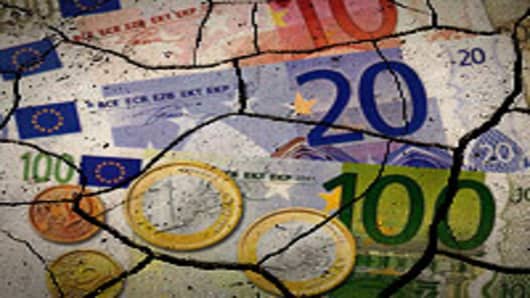With experts talking openly about a potential breakup of the euro zone, here's the vocabulary you need to be in the know.
If only a new year meant a fresh start for the euro zone. Instead, many strategists see further euro weakness ahead, and talk of a potential breakup is continuing.
That's why you need to brush up your...no, not Shakespeare, but the terms you'll need to talk about an end to the currency union. Luckily, Jens Nordvig, global head of G10 FX strategy for Nomura Securities, has published a lengthy analysis of euro zone break-up issues that should help. Here goes.
1. The big bang breakup, or full-blown breakup, is as scary as it sounds. That's the scenario under which the euro simply ceases to exist, as opposed to a partial breakup in which only a few countries exit the single currency.
2. Consensual withdrawal would take place if a country took itself out of the euro in a legally accepted way, possibly using a clause in the Lisbon Treaty.
3. Remember the ECU? That was the basket of individual currencies that preceded the euro, sort of a transitional object that carried countries from their own currencies to the single currency trading today. Nordvig thinks a break-up could be facilitated if euro zone members agreed to create a sort of ECU-2 so that valuations could be established for new national currencies. Trivia point: ECU stood for European Currency Unit but also was pronounced the same as an old French coin - probably one reason the euro has a more neutral name. Some things never change.
4. Lex Monetae - Yes, you're getting a Latin lesson. This is the legal principle that says a country has the right to issue its own currency, and exercises jurisdiction over same. The European Union's laws cover the euro, but countries that exit the euro would have jurisdiction over their own national currencies.
5. Redenomination - the process of converting the price of an asset from one currency to another. This term can cause headaches, or worse.
6. Sequential breakup - a scenario in which the euro zone comes apart in drips and drabs. While you should know the term, Nordvig doesn't think it's likely to happen. "Such an ‘onion peeling process’, during which weaker euro zone countries gradually exit, is likely to come to a halt when the process reaches one of the larger euro zone countries, such as Italy or Spain," he writes. "At this point, we think the process would likely become uncontrollable and lead to a big bang collapse, including the core countries."
7. Unilateral withdrawal would take place if a country withdraws from the euro without waiting for legal approval.
Now, plenty of experts don't think a breakup is likely. Nordvig himself, despite being extremely bearish on the euro itself says that while the risk of break-up rose significantly in 2011, "a break-up of the euro zone is not our central case." Still, there is general consensus that 2012 will be a rocky year on the Continent.
Study your vocabulary, and fasten your seatbelts.
Tune In: CNBC's "Money in Motion Currency Trading" airs on Fridays at 5:30pm and repeats on Saturdays at 7pm.
Learn more: The essential vocabulary for currency trading is on Key Terms Dictionary. Top currency strategies are broken down for you in Currency Class.
Talk back: Tell us what you want to hear about - email us at moneyinmotion@cnbc.com.



